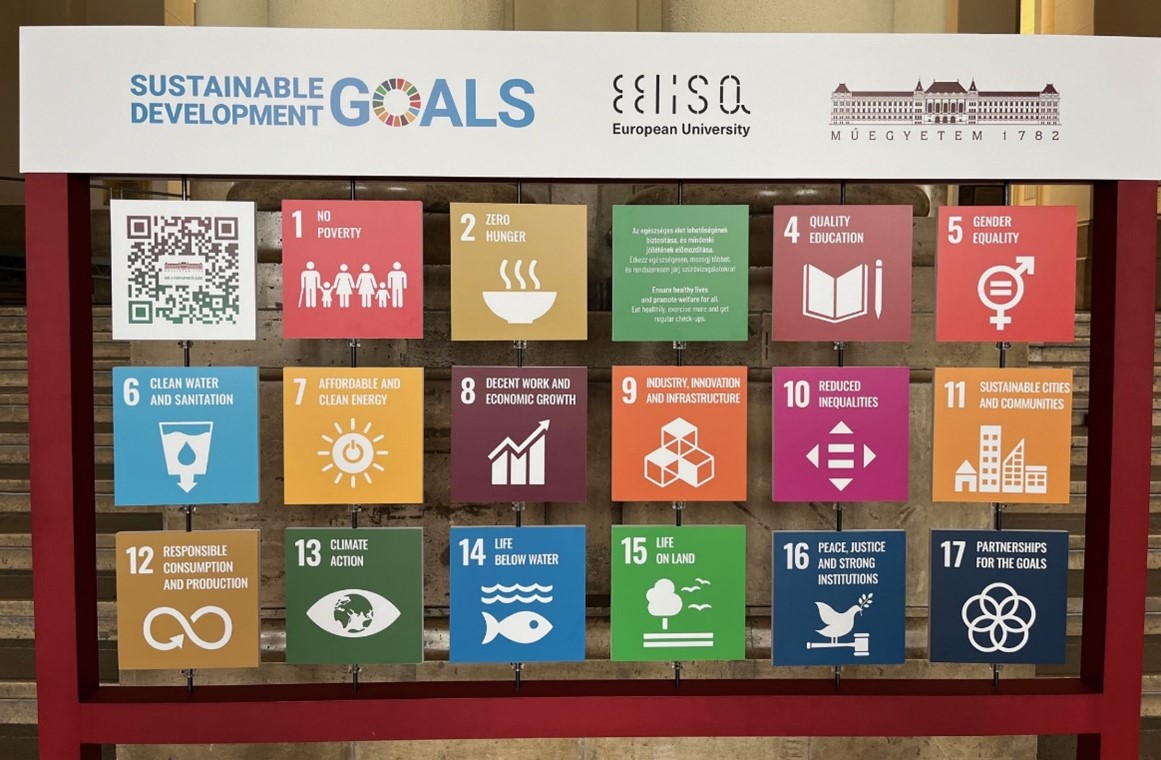News feed
17 goals for a better world – no. 3: good health well-being
2024. 03. 26.Our series of articles entitled “Sustainable Tuesday(s)”, will take a look over 17 weeks at the 17 Sustainable Development Goals (SDGs) set by the UN to make the world a better place.
This time, we will explore in more detail goal no. 3, Good health and well-being, which is to:
Ensure healthy lives and promote well-being for all at all ages.
Eat healthy, exercise more and get regular check-ups!
The BME has a strong history of supporting health and well-being. Sports and physical activity are essential for maintaining good health and a good quality of life. The Budapest University of Technology and Economics is home to MAFC (Technical University Athletics and Football Club), one of the country’s largest sports clubs with deep roots of traditions founded in 1897. The BME Sports Centre opened in September 2012 and offers more than 4000 m2 of facilities, including a three-storey indoor climbing wall, which is a curiosity at university level and is available to university citizens at a special discount. At the BME Sports Complex also offers football, athletics, tennis, beach volleyball and handball courts for university citizens who want to exercise, play sports, relax or even relieve stress. Our sports facilities are also open to outsiders, so we can offer a wider range of people the opportunity to lead a more active lifestyle. The BME boasts 19 Olympic champions, and we hope that this number will continue to increase in the future. On 29 January 2024, the BME Senate established the "BME Alfréd Hajós Award - Best Student Athlete of the Year” recognition, which emphasises that university studies and professional sports are well compatible at BME.
The working group of the Sustainable BME programme promoted cycling as one of the most environmentally friendly and healthiest forms of transport by holding a cycling breakfast in April 2023 and a cycling mileage campaign in May 2023.
The first “Changing Shifts” programme for BME employees in the autumn of 2023 focusing on work-life balance, mental and physical health proved to be a success. The event offered employees screening bus tests and medical risk reduction advice.
|
The term SDG stands for the 17 Sustainable Development Goals established by world leaders at the 2015 UN summit to set new directions for global development. In a series of articles called “Sustainable Tuesday(s”, starting today, we will take a look at the 17 Sustainable Development Goals (SDGs) over 17 weeks and show what BME is doing to achieve them, within its own means. You can check out these development goals in a playful way with the help of boards placed at the entrances of the 3 busiest buildings (E, K, Q) on the BME campus. For more information on this topic, you can join the BME GreenHub Facebook group and visit BME’s main website to access our BME for Sustainability platform. |

In addition to the above, 84 publications, 3 patents, 3 research projects and 37 taught subjects can be linked to the Health and well-being goal, covering the activities of almost all BME faculties. BME for the health industry: introducing smart health devices, next generation medicines, smart information technology solutions and medical decision support. Researchers at the Department of Cognitive Science at the BME’s Faculty of Natural Sciences are conducting extensive research on the topic of preserving human health by discovering developmental and acquired disorders of cognition. In addition to exploring the cognitive and neurobiological mechanisms underlying these disorders, the department’s staff are also working on the development of screening tests and diagnostic procedures that are of paramount importance for social utility.
Furthermore, the BME is participating in the EU's global initiative entitled “EU Joint Programme – Neurodegenerative Disease Research” (JPND) aimed at tackling the challenge of neurodegenerative diseases. Studying Alzheimer’s disease is a key area for understanding cognitive decline and dementia in old age, and neurodegenerative diseases in general, which are placing an increasing burden on societies. This BME research aims to create artificial intelligence models that can integrate multiple human biobanks, spanning multiple domains, modalities and national code systems.
KK (BME a Fenntarthatóságért Munkacsoport)
